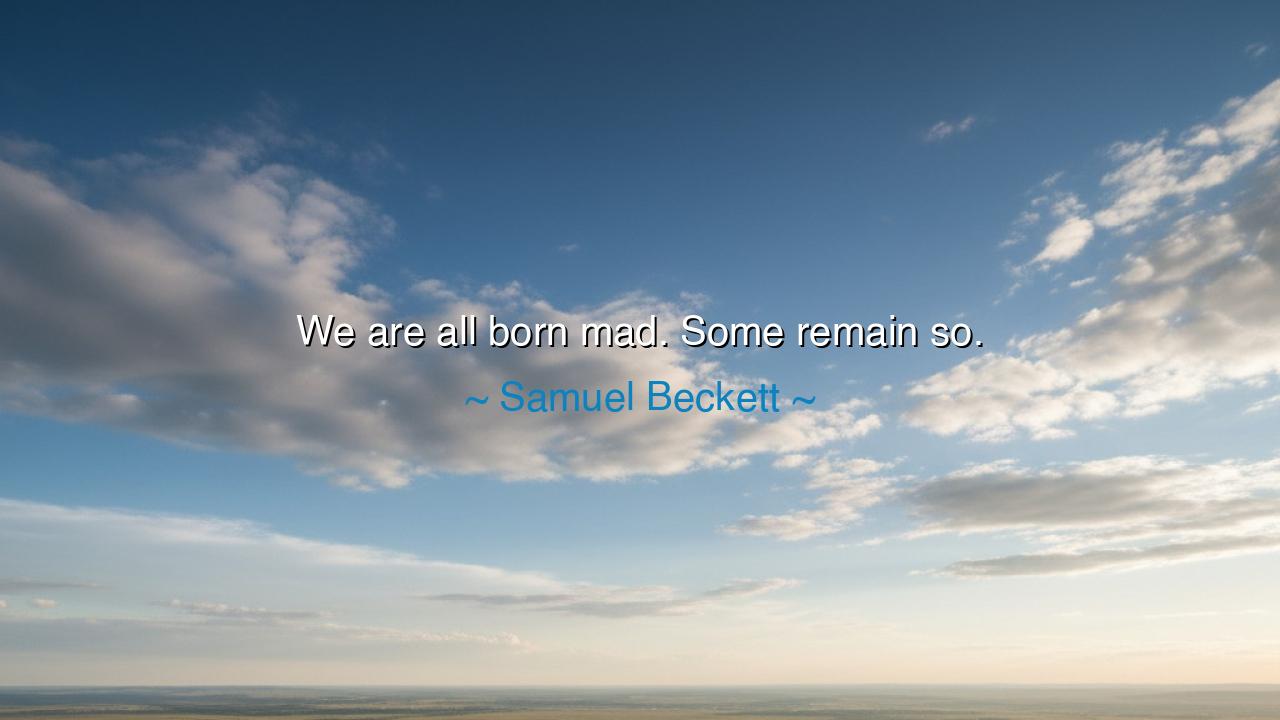
We are all born mad. Some remain so.






"We are all born mad. Some remain so." – Samuel Beckett
In the beginning, before we have learned to name the world or to understand its workings, there exists a wildness within us—a madness that is untamed, unrestrained, and free from the constraints of logic and reason. Samuel Beckett, the master of the absurd, brings us face to face with this truth: madness is not a condition we acquire, but one we are born into. It is the primal chaos that exists before the order of society and the burden of reason impose their will upon us. We arrive in this world like the untamed winds, swirling with confusion, wonder, and infinite possibility, untouched by the logic that will come to shape our minds.
In ancient times, the Greeks spoke of the Daemonic—those forces of the universe that govern both chaos and creativity. They believed that to be human was to be caught between these two realms: the order of the gods and the madness of the mortal soul. In this sense, madness is not something to be feared, but something that stirs the soul to greatness. The philosopher Socrates, often considered the wisest of men, acknowledged a kind of divine madness that guided his thoughts and actions. His very questioning of reality, his refusal to accept easy answers, was a kind of madness that led him to the depths of wisdom and truth. Thus, in madness, there is not only chaos but creativity, the spark of genius that can bring forth new worlds.
Yet, as Beckett so poignantly states, some remain mad, unable to navigate the transition from this primal state to the ordered world of reason. As we age, society attempts to impose its structure upon us. We are taught to think rationally, to align with the norms and expectations of those who came before us. But, as Beckett implies, not all of us make the journey into sanity. Some souls, whether by design or by fate, remain caught in the wild torrents of their own minds, refusing or unable to submit to the rules that govern the world. They are the poets, the visionaries, and sometimes the outcasts, whose madness becomes their path to truth, their gift to the world.
Consider the life of Vincent van Gogh, whose genius was shaped by the very madness Beckett speaks of. Van Gogh's mind was an extraordinary landscape, constantly shifting and spiraling, both in torment and in creation. His art was born from the madness within him—his passionate use of color and form was driven by his inner turmoil, a madness that was both his curse and his salvation. For van Gogh, the world of reason could not contain him; his vision of life was one of pure emotional intensity, unrestrained by the confines of conventional thought. And yet, in this madness, he created works that continue to move and inspire the world, his madness transcending the chaos of his mind to become a beacon of brilliance for future generations.
Yet, Beckett's quote does not merely celebrate madness in the form of creative genius. It also speaks to the tragedy of those who remain lost in their minds, unable to find a way back to the shore of reason and clarity. Throughout history, we find souls who, caught in the currents of their own emotions and thoughts, are unable to escape the madness that consumes them. King Lear, in Shakespeare’s tragedy, represents this tragic end: a wise ruler undone by the madness of old age, unable to reconcile his own delusions with the reality of his kingdom. He too was born mad, but where Socrates found wisdom in madness, Lear found destruction. It is a reminder that madness, though a potential source of creativity, can also lead to ruin if left unchecked or unexamined.
The true lesson in Beckett’s words lies not in the madness itself, but in the balance we must find between it and reason. We are born with the potential for both chaos and order, for both wildness and structure. It is not that we must abandon one for the other, but that we must learn to navigate the tension between them. The ancient Stoics taught us that the key to a virtuous life lies in embracing the wildness of the soul without being consumed by it. We must acknowledge our own madness, our own passions and desires, and channel them into something greater than ourselves. This balance is what allows us to live not just as rational creatures, but as fully realized human beings, who are both wild and wise, both free and disciplined.
Let us then, in our own lives, embrace the madness of our youth, the chaos that drives us toward innovation, toward creative expression, and toward the deepest truths. But let us also remember that we must master that madness, guiding it with the wisdom that comes from experience, from reflection, and from the lessons of history. For to live a life fully, to fulfill our greatest potential, is to balance the madness of our birth with the reason that the world requires of us. We must learn to remain both wild and sane, using the fire within us to light the path forward, not to burn it all down.






AAdministratorAdministrator
Welcome, honored guests. Please leave a comment, we will respond soon